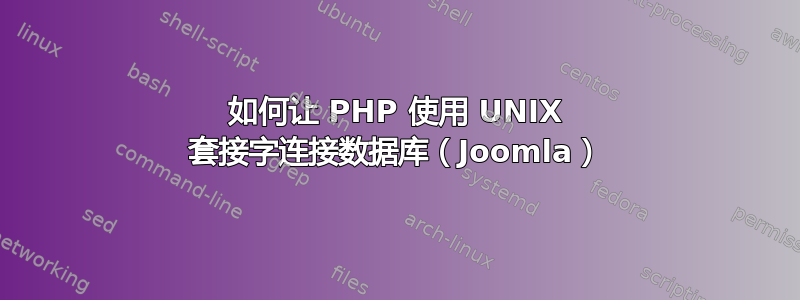
我希望我的 PHP 应用程序(例如 Joomla)使用 UNIX 套接字连接到本地 mysql 数据库。
我已经配置了 php.ini:
mysqli.default_socket = /var/run/mysqld/mysqld.sock
mysql.default_socket = /var/run/mysqld/mysqld.sock
pdo_mysql.default_socket=/var/run/mysqld/mysqld.sock
但在 Joomla 中,我只能将 localhost 或 127.0.0.1 设置为数据库,是否可以覆盖此功能?如何测试 UNIX 套接字是否实际被使用?
我的 MySQL/MariaDB 配置如下:
[client]
port = 3306
socket = /var/run/mysqld/mysqld.sock
[mysqld_safe]
socket = /var/run/mysqld/mysqld.sock
nice = 0
[mysqld]
user = mysql
pid-file = /var/run/mysqld/mysqld.pid
socket = /var/run/mysqld/mysqld.sock
port = 3306
basedir = /usr
datadir = /var/lib/mysql
tmpdir = /tmp
lc_messages_dir = /usr/share/mysql
lc_messages = en_US
skip-external-locking
bind-address = 127.0.0.1
max_connections = 500
connect_timeout = 10
wait_timeout = 600
max_allowed_packet = 16M
thread_cache_size = 1000
sort_buffer_size = 512M
bulk_insert_buffer_size = 16M
tmp_table_size = 8G
max_heap_table_size = 8G
myisam_recover = FORCE,BACKUP
key_buffer_size = 128M
open-files-limit = 65535
table_open_cache = 10240
table_open_cache_instances = 8
table-definition-cache = 4096
myisam_sort_buffer_size = 512M
key-cache-segments=8
concurrent_insert = 2
read_buffer_size = 32M
read_rnd_buffer_size = 64M
query_cache_limit = 96M
query_cache_size = 128M
query_cache_min_res_unit=7108
query_cache_type = 1
log_warnings = 2
slow_query_log_file = /var/log/mysql/mariadb-slow.log
long_query_time = 10
log_slow_verbosity = query_plan
log_bin = /var/log/mysql/mariadb-bin
log_bin_index = /var/log/mysql/mariadb-bin.index
sync_binlog = 1
expire_logs_days = 14
max_binlog_size = 100M
default_storage_engine = InnoDB
innodb_log_file_size = 50M
innodb_buffer_pool_size = 6G
innodb_buffer_pool_instances=8
innodb_log_buffer_size = 32M
innodb_file_per_table = 1
innodb_concurrency_tickets=5000
innodb_open_files = 240000
innodb_io_capacity = 240000
innodb_flush_method = O_DIRECT
innodb-log-files-in-group = 2
innodb-flush-log-at-trx-commit = 1
[mysqldump]
quick
quote-names
max_allowed_packet = 16M
[mysql]
#no-auto-rehash # faster start of mysql but no tab completition
[isamchk]
key_buffer = 512M
!includedir /etc/mysql/conf.d/
答案1
127.0.0.1 用于 TCP 套接字。
'localhost' 用于 Unix 文件系统套接字。
我们可以用来netstat -ln | grep 'mysql'确定连接方法,并探索选项来强制执行特定类型
shell> mysql --host=127.0.0.1
shell> mysql --protocol=TCP
shell> mysql --host=localhost
shell> mysql --host=localhost --protocol=TCP
连接参数应该是这样的
$link = mysql_connect('localhost:/var/run/mysqld/mysqld.sock', 'mysql_user', 'mysql_password');
var $host = ':/var/run/mysqld/mysqld.sock';
var $user = 'your_user_db_name';
var $db = 'your_db_name';
var $password = 'your_db_password';
答案2
在 libraries/joomla/database/database.php 中定义了抽象类 JDatabase,然后在 libraries/joomla/database/driver/ 中为不同数据库类型实现该类,在本例中为 mysql 或 mysqli..
在 mysqli.php (Joomla! 3.3.6) 中,如果 configuration.php 中未指定任何内容,则 __construct($options) 将设置默认值,将其更改为 'localhost'。从第 64 行开始:
public function __construct($options)
{
// Get some basic values from the options.
$options['host'] = (isset($options['host'])) ? $options['host'] : 'localhost';
$options['user'] = (isset($options['user'])) ? $options['user'] : 'root';
$options['password'] = (isset($options['password'])) ? $options['password'] : '';
$options['database'] = (isset($options['database'])) ? $options['database'] : '';
$options['select'] = (isset($options['select'])) ? (bool) $options['select'] : true;
$options['port'] = null;
$options['socket'] = null;
// Finalize initialisation.
parent::__construct($options);
}
然后,函数 connect() 最终使用它们在 163-165 行创建连接:
$this->connection = @mysqli_connect(
$this->options['host'], $this->options['user'], $this->options['password'],
null, $this->options['port'], $this->options['socket']
);
如果没有其他规定,mysqli_connect()使用 php.ini 中的默认主机名、端口和套接字
mysqli mysqli_connect ([ string $host = ini_get("mysqli.default_host")
[, string $username = ini_get("mysqli.default_user")
[, string $passwd = ini_get("mysqli.default_pw")
[, string $dbname = ""
[, int $port = ini_get("mysqli.default_port")
[, string $socket = ini_get("mysqli.default_socket") ]]]]]] )
现在您知道了影响这些连接参数的整个轨迹。通过编辑 mysqli.php,您应该能够强制执行 configuration.php 不允许您更改的设置。但是,您应该小心并考虑记录这些修改,因为
- configuration.php 不再像文档中描述的那样工作
- Joomla 更新可以(并最终将)覆盖您的修改
- 其他因素可能取决于此特定配置


